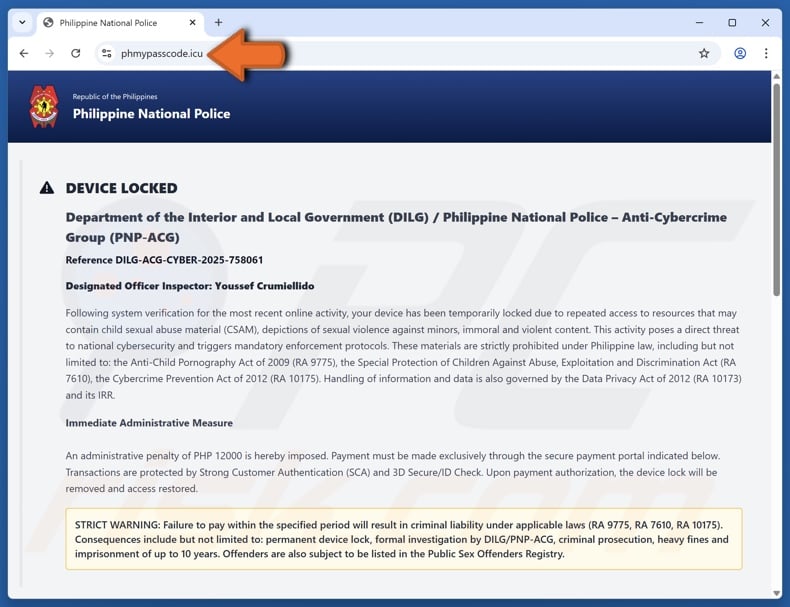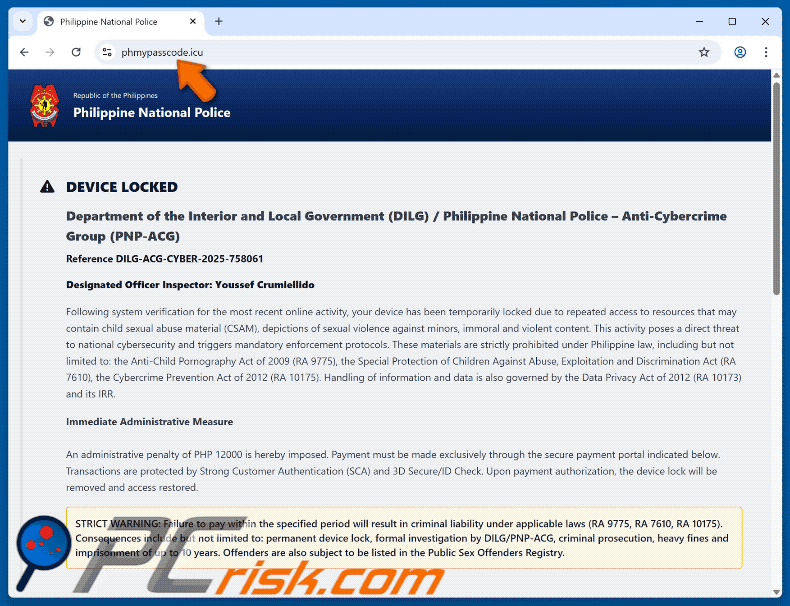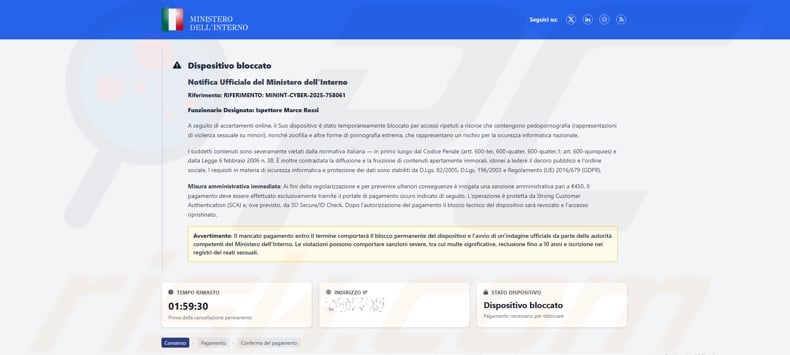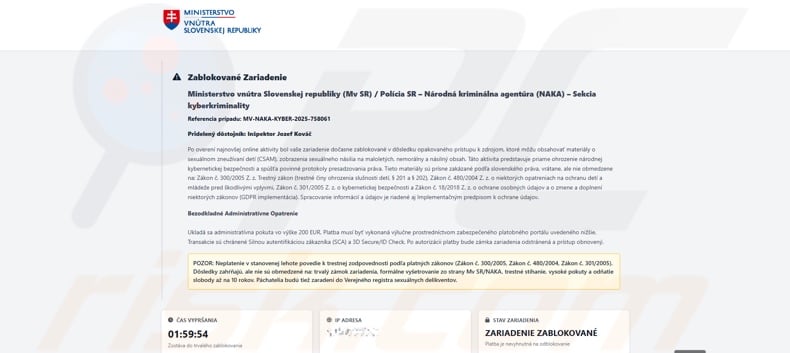How to identify "Device Locked Due To Access To Illegal Content" scam sites
Phishing/ScamAlso Known As: "Device Locked Due To Access To Illegal Content" scam website
Get free scan and check if your device is infected.
Remove it nowTo use full-featured product, you have to purchase a license for Combo Cleaner. Seven days free trial available. Combo Cleaner is owned and operated by RCS LT, the parent company of PCRisk.com.
What kind of scam is "Device Locked Due To Access To Illegal Content"?
"Device Locked Due To Access To Illegal Content" is a multilingual scam claiming that users' devices have been blocked due to repeated access to online resources containing illegal pornographic content. The goal is to deceive victims into paying a bogus fine – sending money to scammers. It must be emphasized that this scam is not associated with any legitimate authorities.

"Device Locked Due To Access To Illegal Content" scam overview
The "Device Locked Due To Access To Illegal Content" scam is available in multiple languages, including English, Italian, Slovak, and others. These fake webpages claim to be associated with genuine authorities; the names and emblems differ depending on the intended victims' locales (such as those of regional police, national cybercrime institutions, etc.).
The basic theme of the scam is an authority stating that the visitor's device has been blocked due to repeated visits to online resources hosting illegal pornographic content – commonly including sexually-charged or sexually-violent material depicting minors. The scam details statutes or articles relating to the previously mentioned illegal content.
The user is fined (amount and currency vary between variants) and given a payment deadline. The page warns that failure to comply can result in a permanent device lock, substantially larger fines, criminal investigation and prosecution, inclusion in sex offenders' lists, or imprisonment.
It must be reiterated that the claims made by this scam are false, and this scam is in no way associated with any genuine authorities or other entities.
Victims of such scams are forced into paying fake fines – thus experiencing a financial loss. It is noteworthy that this type of fraud may involve additional elements, including the theft of private data (e.g., credit/debit card numbers, personally identifiable information, etc.). Hence, scammers may use exposed financial data to make unauthorized online purchases or fraudulent transactions. Likewise, the scam may also pose risks relating to severe privacy issues and identity theft.
Deceptive webpages that claim the visitor's device has been locked often prevent users from exiting. In this case, end the browser process using Task Manager. Remember that restoring the previous browsing session will reopen the scam site; therefore, start a new one when relaunching the browser.
| Name | "Device Locked Due To Access To Illegal Content" scam website |
| Threat Type | Phishing, Scam, Social Engineering, Fraud |
| Fake Claim | User must pay a fine for accessing illegal content and unblock their device. |
| Related Domains | corazstop[.]cyou; ecmypasscode[.]icu; ecpremiasslp[.]site; gbmypasscode[.]icu; gbpremiasslp[.]site; gbsaks[.]cyou; gbservstp[.]cyou; gbsiteslocks[.]cyou; grmypasscode[.]icu; itmypasscode[.]icu; itpremiasslp[.]site; itsaks[.]cyou; itsiteslocks[.]cyou; phmypasscode[.]icu; phpremiasslp[.]site; romypasscode[.]icu; ropremiasslp[.]site; rosaks[.]cyou; rositeslocks[.]cyou; skmypasscode[.]icu; slmypasscode[.]icu; etc. |
| Detection Names (phmypasscode[.]icu) | CyRadar (Malicious), Fortinet (Phishing), Seclookup (Malicious), alphaMountain.ai (Spam), Forcepoint ThreatSeeker (Suspicious), Full List Of Detections (VirusTotal) |
| Serving IP Address (phmypasscode[.]icu) | 85.208.84.175 |
| Distribution methods | Compromised websites, rogue online pop-up ads, potentially unwanted applications. |
| Damage | Loss of sensitive private information, monetary loss, identity theft, possible malware infections. |
| Malware Removal (Windows) |
To eliminate possible malware infections, scan your computer with legitimate antivirus software. Our security researchers recommend using Combo Cleaner. Download Combo CleanerTo use full-featured product, you have to purchase a license for Combo Cleaner. 7 days free trial available. Combo Cleaner is owned and operated by RCS LT, the parent company of PCRisk.com. |
Online scams in general
We have investigated thousands of online scams, and while they are notorious for being poorly made, they can be competently put together and convincingly disguised as content associated with legitimate entities. The purpose of an online scam is to trick users into performing specific actions, such as sending money to scammers, disclosing sensitive information, downloading/installing software, purchasing products, calling fraudulent support lines, allowing scammers to access devices remotely, and so forth.
Various lures are used to deceive victims into complying, including accusations/fines, device infections, online account issues, expired subscriptions, critical software updates, refunds, lotteries, giveaways, and so on.
Due to how widespread scams are on the Web and how well-made they can be – we highly recommend exercising caution when browsing.
How did I open a scam website?
The "Device Locked Due To Access To Illegal Content" scam has been pushed via adverts on sites hosting pornographic and similar adult-oriented content. Other promotional techniques are not unlikely.
Online scams are most commonly endorsed through malvertising (intrusive ads), spam (e.g., browser notifications, emails, social media/ forum posts, DMs/PMs, cold calls/ robocalls, SMSes, etc.), websites using rogue advertising networks (redirects), typosquatting (mistyped URLs), and adware (advertisements or redirects).
How to avoid visiting scam websites?
Caution is essential to your online safety. Therefore, be wary of websites, advertisements, and messages urging you to take immediate action or making unbelievable promises. Pay attention to URLs and enter them with care.
Do not open sites offering pirated programs/media or other dubious services (e.g., Torrenting, illegal streaming/downloading, etc.), as these webpages typically employ rogue advertising networks. Do not permit suspicious pages to deliver browser notifications; ignore or deny their requests (i.e., click "Block", "Block Notifications", etc.).
Be vigilant with incoming emails and other messages; do not open attachments or links present in suspect/irrelevant mail. Download only from official/trustworthy sources and be attentive during installation (e.g., read terms, study options, use "Custom/Advanced" settings, and opt out of all additional apps, extensions, etc.) – to prevent bundled/harmful software from infiltrating the system.
If your computer is already infected, we recommend running a scan with Combo Cleaner Antivirus for Windows to automatically eliminate all threats.
Text presented in an English variant of the "Device Locked Due To Access To Illegal Content" scam:
Republic of the Philippines
Philippine National PoliceDEVICE LOCKED
Department of the Interior and Local Government (DILG) / Philippine National Police – Anti-Cybercrime Group (PNP‑ACG)
Reference DILG-ACG-CYBER-2025-758061Designated Officer Inspector: Youssef Crumiellido
Following system verification for the most recent online activity, your device has been temporarily locked due to repeated access to resources that may contain child sexual abuse material (CSAM), depictions of sexual violence against minors, immoral and violent content. This activity poses a direct threat to national cybersecurity and triggers mandatory enforcement protocols. These materials are strictly prohibited under Philippine law, including but not limited to: the Anti‑Child Pornography Act of 2009 (RA 9775), the Special Protection of Children Against Abuse, Exploitation and Discrimination Act (RA 7610), the Cybercrime Prevention Act of 2012 (RA 10175). Handling of information and data is also governed by the Data Privacy Act of 2012 (RA 10173) and its IRR.
Immediate Administrative Measure
An administrative penalty of PHP 12000 is hereby imposed. Payment must be made exclusively through the secure payment portal indicated below. Transactions are protected by Strong Customer Authentication (SCA) and 3D Secure/ID Check. Upon payment authorization, the device lock will be removed and access restored.
STRICT WARNING: Failure to pay within the specified period will result in criminal liability under applicable laws (RA 9775, RA 7610, RA 10175). Consequences include but not limited to: permanent device lock, formal investigation by DILG/PNP‑ACG, criminal prosecution, heavy fines and imprisonment of up to 10 years. Offenders are also subject to be listed in the Public Sex Offenders Registry.
Time remaining 01:59:15 Before permanent deletion
IP Address 85.206.10.62
Device Status Device Locked Payment required to unlock
Appearance of this English variant of the "Device Locked Due To Access To Illegal Content" scam (GIF):

Screenshot of "Device Locked Due To Access To Illegal Content" scam's Italian variant:

Text presented in this variant:
Dispositivo bloccato
Notifica Ufficiale del Ministero dell'Interno
Riferimento: RIFERIMENTO: MININT-CYBER-2025-758061
Funzionario Designato: Ispettore Marco Rossi
A seguito di accertamenti online, il suo dispositivo e stato temporaneamente bloccato per accessi ripetuti a risorse che contengono pedopornogratia (rappresentazion di violenza sessuale su minori), nonché zoofilia e altre forme di pornografia estrema, che rappresentano un rischio per la sicurezza informatica nazionale.
I suddetti contenuti sono severamente vietati dalla normativa italiana - in primo luogo dal Codice Penale (artt. 600-ter, 600-quater, 600-quater. 1; art. 600-quinquies) e dalla Leade 6 febbraio 2006 n. 38. E inoltre contrastata la diffusione e la fruizione di contenuti apertamente immorali, idonei a ledere il decoro pubblico e l'ordine sociale. I requisiti in materia di sicurezza informatica e protezione dei dati sono stabiliti da D.Lgs. 82/2005, D.Lgs. 196/2003 e Regolamento (UE) 2016/679 (GDPR).
Misura amministrativa immediata: Ai fini della regolarizzazione e per prevenire ulteriori conseguenze è irrogata una sanzione amministrativa pari a €450. Il pagamento deve essere effettuato esclusivamente tramite il portale di pagamento sicuro indicato di seguito. L'operazione è protetta da Strong Customer Authentication (SCA) e, ove previsto, da 3D Secure/ID Check. Dopo l'autorizzazione del pagamento il blocco tecnico del dispositivo sarà revocato e l'accesso ripristinato.
Avvertimento: Il mancato pagamento entro il termine comporterà il blocco permanente del dispositivo e l'avvio di un indagine ufficiale da parte delle autorità competenti del Ministero dell'Interno. Le violazioni possono comportare sanzioni severe, tra cui multe significative, reclusione fino a 10 anni e iscrizione nei
recisti cel reat sessuali.01:59:30
Prima della cancellazione dermanente
Dispositivo bloccato
Pagamento necessario ver soloccare
Screenshot of "Device Locked Due To Access To Illegal Content" scam's Slovak variant:

Text presented in this variant:
Zablokované Zariadenie
Ministersto nútra Slovenskej republiky (Mv SR) / Polícia SR - Národná kriminálna agentúra (NAKA) - Sekcia
kyberkriminalityReferencia pripadu: MV-NAKA-KYBER-2025-758061
Prideleny dôstojnik: Inspektor Jozef Kovác
Po overení najnovsej online aktivity bol vase zariadenie docasne zablokované v dôsledku opakovaného pristupu k zdrojom, ktoré môzu obsahovat' materiály o
sexuálnom zneuzívaní deti (CSAM), zobrazenia sexuálneho násilia na maloletych, nemorálny a násilny obsah. Táto aktivita predstavuje priame ohrozenie národne
kybernetickej bezpenosti a spústa povinné protokoly presadzovania práva. Tieto materiály sú prisne zakázané podia slovenského práva, vrátane, ale nie obmedzene
na: Zákon c. 300/2005 Z. z. Tresty zákon (trestné tiny ohrozenia slusnosti deti, § 201 a 5 202), Zákon . 480/2004 Z. z. o niektorych opatreniach na ochranu detí a mládeze pred skodlivymi plyvmi, Zákon &. 301/2005 Z. z. o kybernetickej bezpenosti a Zákon &. 18/2018 Z. z. o ochrane osobných údajov a o zmene a dopinení
niektorych zákonov (GDPR implementácia). Spracovanie informácií aúdajov je riadené aj Implementaným predpisom k ochrane údajov.Bezodkladné Administrativne Opatrenie
Ukladá sa administrativna pokuta vo vyske 200 EUR. Platba musi byt vykonaná vluăne prostredníctvom zabezpeceného platobného portálu uvedeného nizsie.
Transakcie sú chránené Silnou autentifikáciou zákaznika (SCA) a 3D Secure/ID Check. Po autorizácii platby bude zámka zariadenia odstránená a pristup obnoveny.POZOR: Neplatenie v stanovenej lehote povedie k trestnej zodpovednosti podla platnych zakonov (Zakon č. 300/2005, Zakon č. 480/2004, Zakon č. 301/2005). Dasledky zahfriajti, ale nie su obmedzene na: trvaly zamok zariadenia, formalne vyšetrovanie zo strany Mv SR/NAKA, trestne stihanie, vysoke pokuty a odhatie slobody až na 10 rokov. Pachatelia budU tiež zaradeni do Verejneho registra sexualnych delikventov.
* CAS VYPRSANIAI
01:59:54
Zostáva do trvalého zablokovania€ IP ADRESA
#SLAV VARIAD-NIAI
ZARIADENIE ZABLOKOVANÉ
Platba je nevyhnutná na odblokovanie
Instant automatic malware removal:
Manual threat removal might be a lengthy and complicated process that requires advanced IT skills. Combo Cleaner is a professional automatic malware removal tool that is recommended to get rid of malware. Download it by clicking the button below:
DOWNLOAD Combo CleanerBy downloading any software listed on this website you agree to our Privacy Policy and Terms of Use. To use full-featured product, you have to purchase a license for Combo Cleaner. 7 days free trial available. Combo Cleaner is owned and operated by RCS LT, the parent company of PCRisk.com.
Quick menu:
- What is "Device Locked Due To Access To Illegal Content" scam website?
- How to identify a pop-up scam?
- How do pop-up scams work?
- How to remove fake pop-ups?
- How to prevent fake pop-ups?
- What to do if you fell for a pop-up scam?
How to identify a pop-up scam?
Pop-up windows with various fake messages are a common type of lures cybercriminals use. They collect sensitive personal data, trick Internet users into calling fake tech support numbers, subscribe to useless online services, invest in shady cryptocurrency schemes, etc.
While in the majority of cases these pop-ups don't infect users' devices with malware, they can cause direct monetary loss or could result in identity theft.
Cybercriminals strive to create their rogue pop-up windows to look trustworthy, however, scams typically have the following characteristics:
- Spelling mistakes and non-professional images - Closely inspect the information displayed in a pop-up. Spelling mistakes and unprofessional images could be a sign of a scam.
- Sense of urgency - Countdown timer with a couple of minutes on it, asking you to enter your personal information or subscribe to some online service.
- Statements that you won something - If you haven't participated in a lottery, online competition, etc., and you see a pop-up window stating that you won.
- Computer or mobile device scan - A pop-up window that scans your device and informs of detected issues - is undoubtedly a scam; webpages cannot perform such actions.
- Exclusivity - Pop-up windows stating that only you are given secret access to a financial scheme that can quickly make you rich.
Example of a pop-up scam:

How do pop-up scams work?
Cybercriminals and deceptive marketers usually use various advertising networks, search engine poisoning techniques, and shady websites to generate traffic to their pop-ups. Users land on their online lures after clicking on fake download buttons, using a torrent website, or simply clicking on an Internet search engine result.
Based on users' location and device information, they are presented with a scam pop-up. Lures presented in such pop-ups range from get-rich-quick schemes to fake virus scans.
How to remove fake pop-ups?
In most cases, pop-up scams do not infect users' devices with malware. If you encountered a scam pop-up, simply closing it should be enough. In some cases scam, pop-ups may be hard to close; in such cases - close your Internet browser and restart it.
In extremely rare cases, you might need to reset your Internet browser. For this, use our instructions explaining how to reset Internet browser settings.
How to prevent fake pop-ups?
To prevent seeing pop-up scams, you should visit only reputable websites. Torrent, Crack, free online movie streaming, YouTube video download, and other websites of similar reputation commonly redirect Internet users to pop-up scams.
To minimize the risk of encountering pop-up scams, you should keep your Internet browsers up-to-date and use reputable anti-malware application. For this purpose, we recommend Combo Cleaner Antivirus for Windows.
What to do if you fell for a pop-up scam?
This depends on the type of scam that you fell for. Most commonly, pop-up scams try to trick users into sending money, giving away personal information, or giving access to one's device.
- If you sent money to scammers: You should contact your financial institution and explain that you were scammed. If informed promptly, there's a chance to get your money back.
- If you gave away your personal information: You should change your passwords and enable two-factor authentication in all online services that you use. Visit Federal Trade Commission to report identity theft and get personalized recovery steps.
- If you let scammers connect to your device: You should scan your computer with reputable anti-malware (we recommend Combo Cleaner Antivirus for Windows) - cyber criminals could have planted trojans, keyloggers, and other malware, don't use your computer until removing possible threats.
- Help other Internet users: report Internet scams to Federal Trade Commission.
Frequently Asked Questions (FAQ)
What is an online scam?
Online scams are a type of deceptive Web content that tricks users into performing certain actions. To elaborate, victims can be enticed/scared into sending money to scammers, providing vulnerable information, purchasing products, subscribing to services, downloading/installing programs, calling fake helplines, and so forth.
What is the purpose of online scams?
Online scams are designed to generate revenue for scammers. They predominantly profit by acquiring funds through deception, endorsing content (e.g., sites, products, services, software, etc.), abusing/selling private data, and spreading malware.
Why do I encounter online scams?
Online scams are primarily encountered via intrusive ads (malvertising), webpages using rogue advertising networks, spam (e.g., emails, PMs/DMs, social media posts, browser notifications, calls, SMSes, etc.), misspelled URLs (typosquatting), and adware.
I cannot exit a scam page, how do I close it?
If you cannot exit a scam page, end the browser process using Task Manager. Keep in mind that restoring the previous browsing session will reopen the deceptive website. Therefore, start a new session when reaccessing the browser.
Will Combo Cleaner protect me from online scams?
Combo Cleaner is designed to scan visited websites and detect rogue, scam, and malicious pages. It can also deny all further access to these pages.
Share:

Tomas Meskauskas
Expert security researcher, professional malware analyst
I am passionate about computer security and technology. I have an experience of over 10 years working in various companies related to computer technical issue solving and Internet security. I have been working as an author and editor for pcrisk.com since 2010. Follow me on Twitter and LinkedIn to stay informed about the latest online security threats.
PCrisk security portal is brought by a company RCS LT.
Joined forces of security researchers help educate computer users about the latest online security threats. More information about the company RCS LT.
Our malware removal guides are free. However, if you want to support us you can send us a donation.
DonatePCrisk security portal is brought by a company RCS LT.
Joined forces of security researchers help educate computer users about the latest online security threats. More information about the company RCS LT.
Our malware removal guides are free. However, if you want to support us you can send us a donation.
Donate
▼ Show Discussion